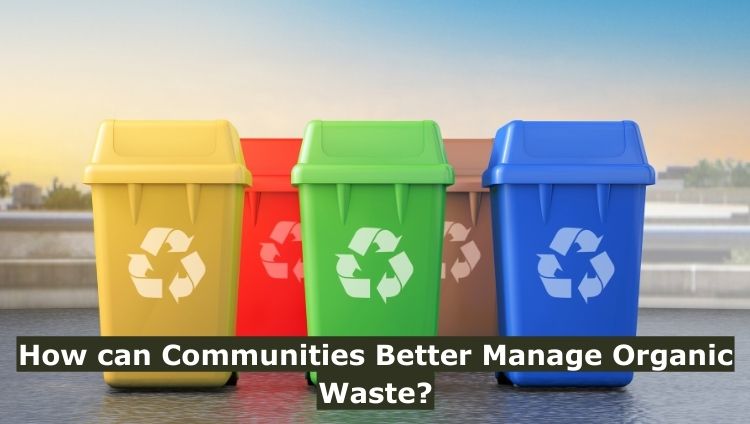Manage Organic Waste – With growing environmental awareness, properly handling organic waste has become more important than ever.
Organic waste means things like extra food and the leaves you clean up from your yard, and it actually takes up a huge part of all the garbage we toss out.
However, if groups of people make clever choices, they can stop this organic waste from piling up in big trash areas and even make it useful.
In this article, we’re going to discuss about the various ways of How can communities better manage organic waste?
Teaching and Learning About Organic Waste
Effective organic waste management hinges on educating the entire community about its significance.
We can achieve this through campaigns that emphasize the importance of separating organic waste from other trash. Schools can contribute significantly by integrating composting projects into their curriculum.
This strategy not only tackles current environmental issues but also prepares the next generation with the skills to manage waste effectively.
Related Post: How to Reduce Waste in Your Daily Life?
Sorting Waste at Home
Another important thing is getting folks to compost their kitchen leftovers and yard stuff right at home.
Communities can help out by showing people how to set up their composting systems at home and maybe even giving them deals on composting bins.
Also, they can start programs where they pick up your organic waste right from your curb, and they’ll give you special bins or bags for it.
This makes it way easier for people to do the right thing with their organic waste.

Building Places for Composting
To manage organic waste properly, we need special spots where the whole community can put their organic waste.
These places can handle lots of organic waste and make really good compost.
We can use this compost nearby to make the soil better for plants, which makes the environment more beautiful.
Plus, it means we don’t have to use as many chemical fertilizers.

Rules and Rewards for Doing the Right Thing
Providing straightforward instructions for separating organic waste from regular trash can be highly effective. When people adhere to these guidelines, it makes a significant difference!
In addition, incentives can serve as powerful motivators. For example, businesses that manage organic waste properly may benefit from lower waste collection fees or even tax advantages.
This approach inspires collective efforts toward maintaining clean and eco-friendly surroundings.
Reduce the amount of organic waste

Community Engagement
Creating community gardens using compost from organic waste can be a great initiative. These gardens not only help reduce waste but also strengthen community bonds.
By collaborating, we can create a more eco-friendly environment. Additionally, hosting events focused on learning and collaborating on organic waste management can be highly beneficial.
This is an opportunity for everyone to participate and contribute to positive change!

Getting Help from the Government
Sometimes, we need money to make our plans for managing organic waste work. We can ask the government for grants and funding.
We can also talk to our local leaders and ask them to make rules that help reduce organic waste and make it easier to recycle.
This way, we get the support we need to make things better for the environment.

Keeping an Eye on Things
To make sure we’re doing a good job with organic waste, we need to keep track of how much of it we make and how much we’re keeping out of the big trash dumps.
We should do this regularly so we can see if we’re getting better and if our plans are working.
If we see we’re not doing well, we can change our ideas to make them better and keep helping the environment.
Frequently Asked Questions
What is organic waste?
Organic waste includes things like food scraps, yard waste, and other natural materials that can break down over time.
Why is it important to manage organic waste?
Properly managing organic waste is crucial because it helps reduce pollution, saves space in landfills, and can be turned into useful compost for gardening and farming.
How can I start composting at home?
You can start composting at home by collecting food scraps, leaves, and other organic materials in a compost bin.
Learn about the right mix of materials and how to maintain it for successful composting.
Are there incentives for businesses to manage organic waste efficiently?
Yes, some places offer incentives like lower waste collection costs or tax benefits to businesses that handle organic waste well.
Conclusion
In conclusion, improving organic waste management benefits both the environment and our communities. What steps can communities take to enhance this effort?
Communities should begin by educating people about the importance of separating organic waste. Key initial measures include implementing home composting systems and setting up composting facilities. Clear regulations and incentives for responsible practices can also have a significant impact.
Further essential actions include promoting food recovery programs, fostering community participation in gardening and events, obtaining government support, and systematically tracking progress.
It’s crucial to recognize that even small actions by individuals and communities can lead to substantial environmental gains.
Through collective effort and informed choices, we can reduce waste, support those in need, and build a healthier, more sustainable future for everyone.
For a deeper understanding of effective waste management strategies, we welcome you to delve into the resources provided on our Blog.


